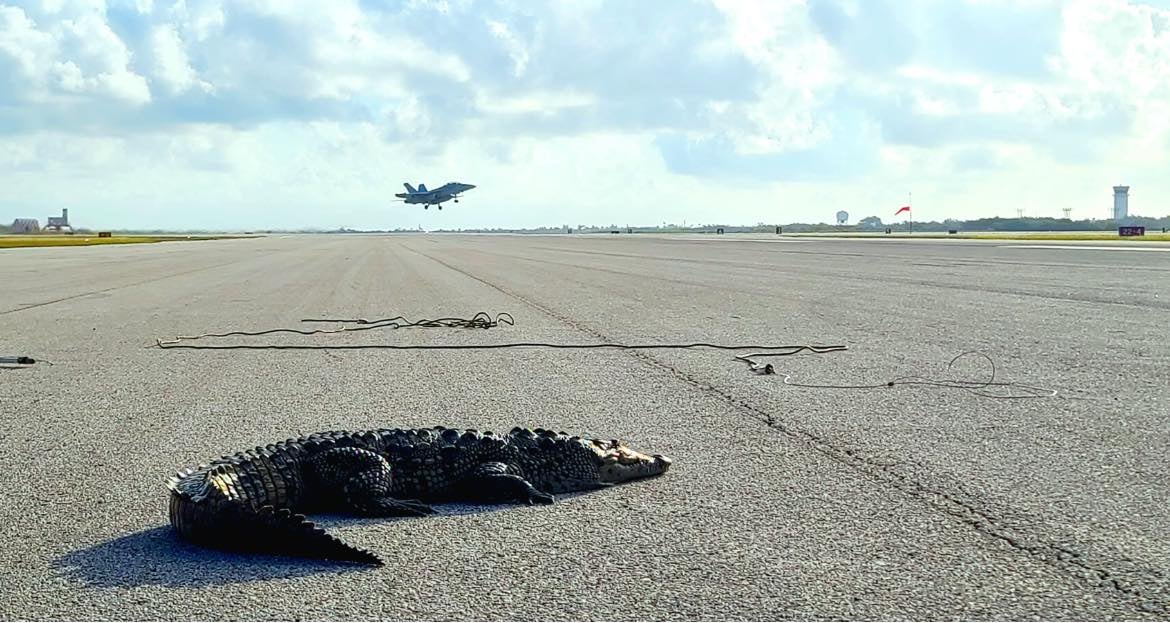Sunbathing crocodile blocks runway at US Navy base in Florida
‘This airfield resident was soaking up some sun on one of our runways recently and didn’t want to budge,’ says Naval Air Station Key West

Your support helps us to tell the story
From reproductive rights to climate change to Big Tech, The Independent is on the ground when the story is developing. Whether it's investigating the financials of Elon Musk's pro-Trump PAC or producing our latest documentary, 'The A Word', which shines a light on the American women fighting for reproductive rights, we know how important it is to parse out the facts from the messaging.
At such a critical moment in US history, we need reporters on the ground. Your donation allows us to keep sending journalists to speak to both sides of the story.
The Independent is trusted by Americans across the entire political spectrum. And unlike many other quality news outlets, we choose not to lock Americans out of our reporting and analysis with paywalls. We believe quality journalism should be available to everyone, paid for by those who can afford it.
Your support makes all the difference.Planes at a US Navy base in Florida had to be rerouted after a sunbathing crocodile wouldn’t leave the runway.
Naval Air Station Key West, in South Florida, posted a photo of the seven-foot, 110-lb reptile on Monday. According to the base, the croc was simply enjoying the sun too much to move.
“This airfield resident was soaking up some sun on one of our runways recently and didn’t want to budge,” NAS wrote on Facebook. “Wildlife Biologist Rosa Gonzales had to call in reinforcement from Florida Fish and Wildlife Conservation to move the stubborn American crocodile outside the fence line.”
Officials at the base say the predator was safely relocated to another area. In the meantime, Navy jets landed on a different runway.
Close encounters with crocodiles are not unusual at NAS Key West, which is located within the Florida Keys National Marine Sanctuary.
“We have crocs that live on our airfield and every once in a while they find themselves on the runway,” NAS spokesperson Danette Baso Silvers told the Miami Herald. “Usually they can make them scurry away. But this one was stubborn.”
In fact, NAS officials say the station is home to at least half a dozen of the animals.
“We have six or seven crocodiles on base,” Wendy Wheatley-Techmer, NAS’s natural resources manager, told the Herald. “Our mission is to fly aircraft and train pilots but we have this co-existing relationship with the crocodiles. We just kind of live with them.”
American crocodiles live primarily in South Florida. They were once an endangered species, but in recent decades they’ve been making a comeback. According to the Florida Fish and Wildlife Conservation Commission, since 1975 the number of adult American crocs has jumped from less than 300 to more than 2,000.
“Sightings of American crocodiles have increased as the result of their recovery along with the growing number of people spending time on or near the waters of south Florida,” the Commission says. “Due to the American crocodile’s shy and reclusive nature, conflicts between them and people are extremely rare in Florida.”
By following a few simple safety tips, the Commission says, “people can safely coexist with American crocodiles” – just as they do at NAS Key West.”





Join our commenting forum
Join thought-provoking conversations, follow other Independent readers and see their replies
Comments